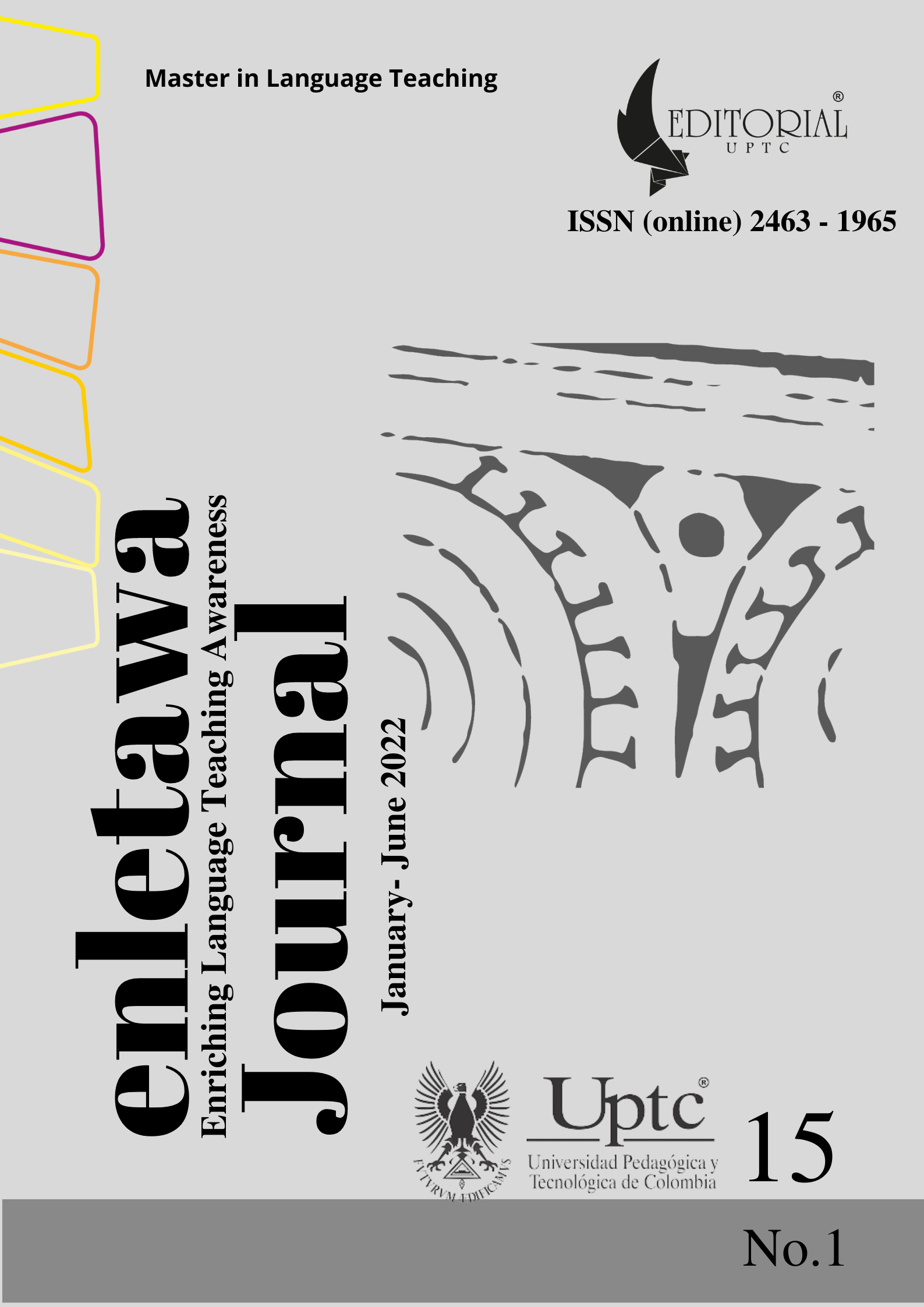Comunidades virtuales de aprendizaje: una contribución al aprendizaje de los futuros profesores

Resumen
Este trabajo expone el aprendizaje de didáctica y metodologías de enseñanza de idiomas de los profesores en formación durante su participación en una comunidad virtual de aprendizaje. Se definieron tres conceptos principales: comunidades virtuales de aprendizaje (CVA), práctica reflexiva, y aprendizaje desde una perspectiva sociocultural. Participaron en la CVA 25 profesores en formación de una licenciatura en enseñanza de idiomas. Para recoger la información se utilizó un grupo de discusión y la reflexión de los profesores en formación en la CVA. Los resultados muestran que los profesores en formación aprendieron a reflexionar y a utilizar materiales didácticos eficaces, a seleccionar, adaptar y combinar metodologías de enseñanza de idiomas, así como a criticarse a sí mismos, a su plan de clases y a su rendimiento, con el fin de mejorar su práctica docente
Palabras clave
aprendizaje, práctica reflectiva, comunidad de aprendizaje virtual
Biografía del autor/a
Catalina Herrera Mateus
Magister in Education, Academic Coordinator, Corporación Universitaria Minuto de Dios
Brenda Julieth Herrera Varela
Bachelor Degree in Language Teaching, Academic Coordinator, Passport Language Center
John Jairo García Arjona
Bachelor Degree in Language teaching, Language teacher, Corporación Universitaria Minuto de
Dios
Citas
- Benavides, W. I. (2012). El aprendizaje colaborativo en ambientes virtuales. En Blanco y Negro, 3(1), 42-47.
- Borg, S. (2006). Teacher Cognition and Language Education: Research and Practice. Continuum.
- Botero, L. (2013). La influencia de las comunidades virtuales de aprendizaje en los idiomas. Bachelor's thesis. Universidad EAN, Bogotá, Colombia. https://repository.universidadean.edu.co/handle/10882/4124
- Bozu, Z., & Imbernon-Muñoz, F. (2009). Teaching Portfolios as a Formative Strategy for a Reflective Practice on Beginner University Professors. Revista d'Innovació i Recerca En Educació, 2(2), 61-73. https://doi.org/10.1344/reire2009.2.2224
- Cote, G. E. (2012). The Role of Reflection During the First Teaching Experience of Foreign Language Pre-Service Teachers: An Exploratory Case Study. Colombian Applied Linguistics Journal, 14(2), 24-34. DOI: https://doi.org/10.14483/udistrital.jour.calj.2012.2.a02
- Dillenbourg, P. (1999). What Do you Mean by Collaborative Learning. In Collaborative Learning: Cognitive and Computational Approaches (pp.1-16). Elsevier.
- Farrell, T. S. C. (2007). Reflective Language Teaching: From Research to Practice. Continuum.
- Gardner, H., & Moran, S. (2006). The Science of Multiple Intelligences Theory: A Response to Lynn Waterhouse. Educational Psychologist, 41(4), 227-232. DOI: https://doi.org/10.1207/s15326985ep4104_2
- Hernández, J. (2014). Virtual Communities as a Learning Tool of Foreign Languages. Universidad de Valladolid. http://uvadoc.uva.es/handle/10324/6991
- Insuasty, E., & Zambrano Castillo, L. C. (2010). Exploring Reflective Teaching Through Informed Journal Keeping and Blog Group Discussion in the Teaching Practicum. Profile Issues in Teachers Professional Development, 12(2), 87-105.
- Johnson, K. E. (2009). Second Language Teacher Education: A Sociocultural Perspective. Routledge. DOI: https://doi.org/10.4324/9780203878033
- Johnson, K. E., & Golombek, P. R. (Eds.). (2011). Research on Second Language Teacher Education: A Sociocultural Perspective on Professional Development. Routledge.
- Juliao, C. G. (2011). El enfoque praxeológico [Praxeological approach]. Corporación Universitaria Minuto de Dios.
- Morrison, K. (1996). Developing Reflective Practice in Higher Degree Students Through a Learning Journal. Studies in Higher Education, 21(3), 317-332. DOI: https://doi.org/10.1080/03075079612331381241
- Ortega, M., Leal, O. & Herrera, C. (2016). Comunidades de aprendizaje y prácticas pedagógicas. Boletín Redipe, 5(9), 137-145.
- Osmanović, J. (2019). The Perspective of Cognitive Thinking and Reflective Teaching Practice. International Journal of Cognitive Research in Science, Engineering and Education, 7(2), 1. DOI: https://doi.org/10.5937/IJCRSEE1902001M
- Pietkiewicz, I., & Smith, J. A. (2014). A Practical Guide to Using Interpretative Phenomenological Analysis in Qualitative Research Psychology. Psychological journal, 20(1), 7-14. DOI: https://doi.org/10.14691/CPPJ.20.1.7
- Pritchard, A. (2018). Ways of Learning: Learning Theories for the Classroom. Routledge. DOI: https://doi.org/10.4324/9781315460611
- Schön, D. (1987). The Reflective Practitioner (6th ed.), McGraw-Hill.
- Skinner, B. F. (1985). Cognitive Science and Behaviourism. British Journal of psychology, 76(3), 291-301. DOI: https://doi.org/10.1111/j.2044-8295.1985.tb01953.x
- Small, R. (1997). Motivation in Instructional Design. Eric Clearinghouse on Information and Technology.
- Tosta, A. L. (2001). Laugh and Learn: Thinking Over The “Funny Teacher Myth”. English Teaching Forum, 39(1), 26-28.
- Valsineer, J. (1987). Culture and the Development of Children’s Actions: A Cultural–Historical Theory of Developmental Psychology. John Wiley & Sons.
- Vygotsky, L. (1978). Mind in Society: The Development of Higher Psychological Processes. Harvard University Press.
- Witherspoon, E. B., Ferrer, N. B., Correnti, R. R., Stein, M. K., & Schunn, C. D. (2021). Coaching that Supports Teachers’ Learning to Enact Ambitious Instruction. Instructional Science: An International Journal of the Learning Sciences, 49, 877-898. https://doi.org/10.1007/s11251-021-09536-7 DOI: https://doi.org/10.1007/s11251-021-09536-7
- Xingfeng Huang, Mun Yee Lai, & Rongjin Huang. (2021). Teachers’ Learning Through an Online Lesson Study: An Analysis from the Expansive Learning Perspective. International Journal for Lesson & Learning Studies, 10(2), 202-216. https://doi-org.ezproxyegre.uniandes.edu.co:8843/10.1108/IJLLS-09-2020-0076 DOI: https://doi.org/10.1108/IJLLS-09-2020-0076
- Zahid, M., & Khanam, A. (2019). Effect of Reflective Teaching Practices on the Performance of Prospective Teachers. TOJET The Turkish Online Journal of Educational Technology, 18(1). http://www.tojet.net/articles/v18i1/1814.pdf
